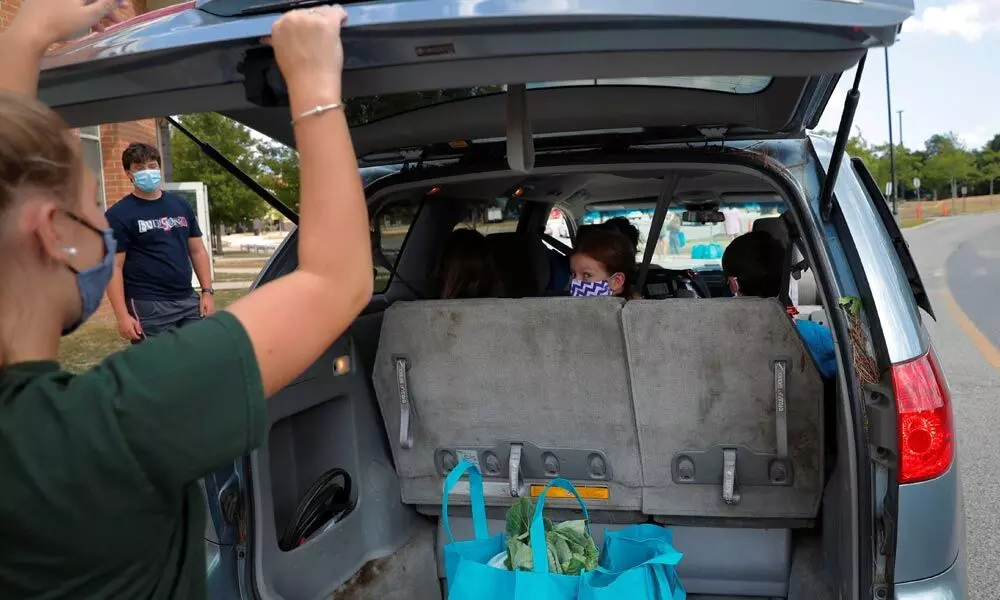Lockdown, leftovers and how food frugality is a climate boon

Lockdown, leftovers and how food frugality is a climate boon
Clint Parry ransacked every kitchen cupboard and scoured all corners of his fridge during lockdown in Detroit, hunting for lost ingredients and leftovers to whip up meals
Clint Parry ransacked every kitchen cupboard and scoured all corners of his fridge during lockdown in Detroit, hunting for lost ingredients and leftovers to whip up meals.
The 33-year-old is one of many people across the world to have embraced thriftiness and cut down on food waste during the Covid-19 pandemic, according to experts. They say the new habits, if maintained, will provide a major boost in tackling another global crisis: climate change.
"We are using virtually all of our leftovers, where we used to waste food because we would forget to pack it and just pick up fast food on a lunch break," said Parry, who is married and works as a master model builder at Legoland in Michigan.
The UN Food and Agriculture Organisation estimates that a third of the world's food is wasted every year. Forests are cleared, fuel is burnt and packaging in produced just to provide food which is thrown away. Meanwhile, rotting food in landfills releases more greenhouse gases into the atmosphere.
As a result, food waste is responsible for around 8% of global greenhouse gas emissions, a similar amount to road transportation.
"The next crisis will be the climate crisis and the best thing you can do as a consumer is reduce food waste," said Toine Timmermans, program manager for sustainable food chains at Wageningen University in the Netherlands.
Household food waste in Britain, to take one country, fell significantly in the early phase of the lockdown in April with just 14% of four key items - bread, chicken, milk and potatoes - thrown away, according to research by environmental group WRAP, which conducted thousands of interviews.
Pre-lockdown, an average of 24% had been wasted.
Waste had begun to rebound by June, with a second WRAP survey putting waste of those products at 18% but remained significantly below pre-lockdown levels.
"Although people are reporting wasting more food as restrictions lift ... the positive news is that 70% of people want to maintain their new-found food management behaviours in the long term," said Richard Swannell, director at WRAP Global which works with governments to reduce food waste.
"This is an encouraging sign that people are taking this opportunity to adopt less wasteful habits in life after lockdown."
Food security has been a major concern during the pandemic as consumers panic-bought basic goods, migrant workers struggled to get to the fields, meat-packing plants shut, and farm goods produced for shuttered restaurants rotted.
But the lower household food waste has been one bright spot.
Out of necessity, consumers have become more organized in planning menus, developed new cooking skills, checked their cupboards and fridges more before they shop and found better ways to use up leftovers, according to food waste experts.
"What people have been forced to do during the pandemic is plan ahead because they're now shopping less frequently," said Dana Gunders, executive director at ReFED, a nonprofit dedicated to reducing wasted food across the United States.
"They're being forced to cook more and build those cooking skills."
Laura Brooks, a stay-at-home mother of five in Weymouth, Massachusetts, said she had developed useful habits during the lockdown that she would keep.
"I think as things go back to normal, I may continue with less frequent shopping trips. When I go more often, I find that the new produce pushes the old produce out of sight and things get wasted more easily," she added.
Increased frugality could prove a valuable habit in the economic and unemployment crisis caused by the pandemic; Gunders said a family of four in the United States was estimated to throw out food worth about $1,800 a year.
A survey from Germany's Food and Agriculture Ministry also showed consumers had started to show more concern about wasting food during the coronavirus crisis.
The government had launched an anti-food waste campaign called "Too good for the bin" before the crisis, urging the public not to automatically throw food away after the sell-by date but to smell and taste it to see if it was still in good condition.
The Ministry's survey, undertaken during the pandemic, found that 91% of German consumers questioned were now checking food after its sell-by date and not automatically throwing it away.
This compared to only 76% in a similar survey in 2016.
Food waste is not restricted to the home but it is the biggest source in many countries.
The European Union has published a study estimating that 53% of food waste was in households and 11% in production, with the balance in areas such as processing and retailing.
China's President Xi Jingping said this month that the amount of food wasted in China was "shocking", prompting many local governments to launch related campaigns.
For Parry in Detroit, and many others, thrift is here to stay.
"Our food costs have definitely gone way down, since we are not buying out when we have perfectly consumable leftovers in the fridge at home," he said.














